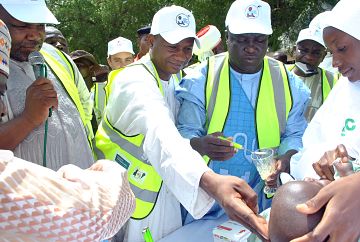Inauguration ceremony and launch of the Nigeria End Malaria Council
16 August 2022
Today in Nigeria, the inauguration and launch of the Nigeria End Malaria Council (NEMC) – a public-private partnership formed to support the National Malaria Elimination Programme (NMEP) in achieving its goal of ending malaria in the country by 2030 – was held in Abuja.
Malaria is one of the leading causes of death in Nigeria, accounting for 27 percent of malaria cases and deaths from the disease globally – the highest malaria burden in the world.
The country’s president, Muhammadu Buhari GCFR, directed the setting up of the Council and said in his opening address to the 16-member Council:
‘‘Our inauguration today will ensure that malaria elimination remains a priority on our agenda, with strong political commitment from leaders at all levels […] The End Malaria Council (EMC) will provide a platform to advocate for more funding to protect and sustain progress made so far by our country and put us on a pathway to ending malaria for good […] EMCs have provided leadership, new funding and innovation to enable countries to stay on track to meet malaria burden reduction targets, and I am optimistic that the setting up of the Nigeria End Malaria Council will do the same for Nigeria.’’
It costs approximately $5 US dollars per Nigerian to prevent malaria, but 50 percent – almost 6 billion – of the activities included in the country’s National Malaria Strategic Plan (NMSP) are unfunded. The Council seeks to mobilise resources to remove operational barriers and close budget gaps, advocating to keep malaria elimination high on the national development agenda and meeting quarterly to ensure their commitments are honoured.
Dr Maxwell Kolawole, Malaria Consortium West & Central Africa Programmes Director, and Chairperson of the Roll Back Malaria (RBM) Technical Working Group, invited to speak at the event, commented: “This is momentous step forward in Nigeria’s efforts to overcome malaria in the country. It is a symbolic of the will that exists to reach elimination and the potential of what can be achieved through multilateral collaboration between technical agencies, bilateral organisations, philanthropic donors, international and national NGOs, private sector and academia. Malaria Consortium is proud to have played such an active role in supporting the government to deliver on its commitments to accelerate progress towards eliminating malaria in Nigeria.”
Malaria Consortium has supported the National Malaria Elimination Programme and subnational malaria programmes to lead the response to reduce the malaria burden in Nigeria through evidence-informed interventions, rolled out at-scale and deployed to optimise resources and strengthen health systems. This has helped to overcome a lack of data around health more widely, which impacts the amount of evidence available for decision-making. Through the Reducing the malaria burden project, Malaria Consortium is delivering a set of interventions to develop capacity around reporting and case management within the public health system.
Malaria morbidity in Nigeria varies widely in terms of geography, gender and age, with pregnant women and young children particularly at risk. To reduce malaria morbidity and mortality in infants, Malaria Consortium is supporting the National Primary Health Care Development Agency (NPHCDA) to implement intermittent preventive treatment in infants (IPTi) through the Expanded Programme on Immunization (EPI) – a sulfadoxine-pyrimethamine (SP) treatment programme for infants, recommended by the World Health Organization in areas with moderate to high malaria transmission.
Malaria Consortium is also a leading implementer of seasonal malaria chemoprevention in Nigeria, a highly effective intervention to prevent malaria involving administering monthly doses of antimalarial drugs to children aged three to 59 months during peak malaria transmission seasons.
Country: Nigeria
Latest news
- International summit calls for AMR accountability in public health interventions21st March 2024
- Global SMC community celebrates new milestone at SMC Alliance Annual Meeting in Nigeria6th March 2024
- Scaling up key interventions could halve pneumonia-related childhood mortality13th February 2024
- Malaria Consortium and eGov Foundation join Mozambique’s national malaria programme to digitalise seasonal malaria chemoprevention campaigns8th February 2024
- World’s first malaria vaccine rollout launched in Cameroon22nd January 2024
- Digital solutions driving equitable access to health6th December 2023